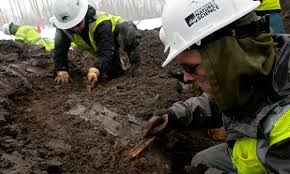Do you dig the Ice Age? Come learn more as Greg McDonald of the National Park Service discusses recent fossil discoveries in Colorado. McDonald will speak at 7 p.m., Thursday, April 24, at an Explorers Seminar in the Biosphere Discovery Hub in the University of Iowa Museum of Natural History.

In October 2010, a bulldozer operator working near a Colorado ski area uncovered the tusk of a young female mammoth. Over the next 10 months, the Denver Museum of Nature & Science conducted its largest-ever fossil excavation, yielding a treasure trove of well-preserved Ice Age fossils. Museum crews uncovered 5,000 bones of 41 kinds of Ice Age animals, including mammoths, mastodons, ground sloths, camels, deer, horses, and giant bison.
The preserved series of Ice Age fossil ecosystems is one of the most significant fossil discoveries ever made in Colorado. It is the only location in the state where mammoths and mastodons are found together, and one of only a handful of high altitude fossil sites.
McDonald is a senior curator of Natural History for the National Park Service and a paleontologist who focuses on Ice Age ground sloths. He has also worked for the Cincinnati Museum of Natural History, the Idaho Museum of Natural History, and the Royal Ontario Museum. He consulted with the UI Museum of Natural History on the construction of Rusty, a model of a giant ground sloth on exhibit in Iowa Hall.
A Q&A session and cupcakes from Molly’s Cupcakes will follow the talk. For more information on the Explorers Seminar Series, visit the Museum of Natural History website or call 319-335-0606.
Individuals with disabilities are encouraged to attend all UI-sponsored events. If you are a person with a disability who requires a reasonable accommodation in order to participate in this program, contact the UI Museum of Natural History in advance at 319-335-2010.